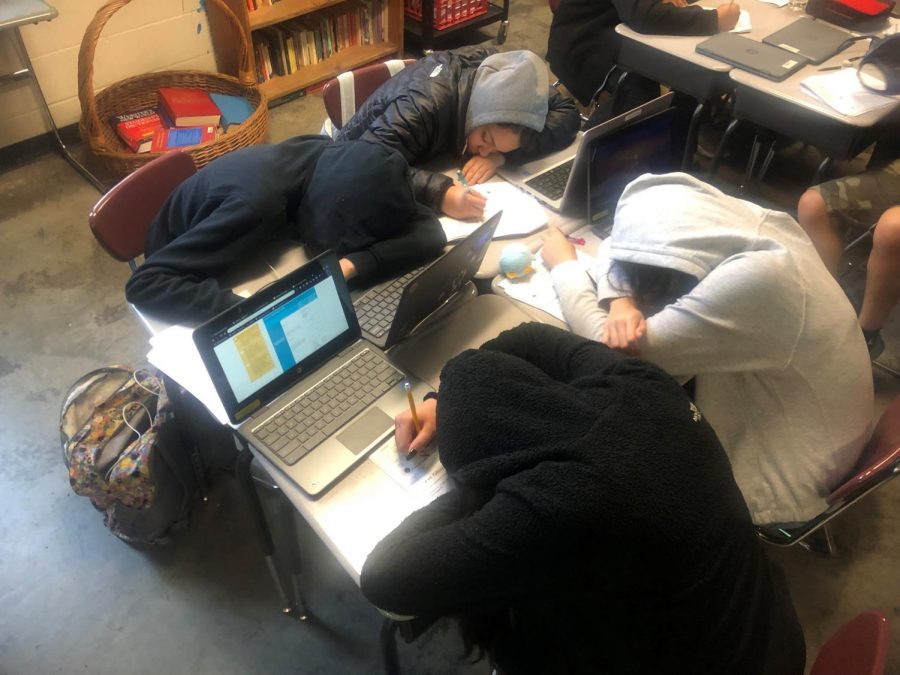Sleep Loss and Teens
May 16, 2019
Teens across the US are not getting enough sleep.
There are numerous downsides to not getting enough sleep, and teens will always claim to need more sleep than what they receive. Addressing the sources of sleep deprivation can play a key role in understanding why it takes a toll on teens and how it can be minimized to maximize those sweet hours of sleep. In the end, teens will always need more rest time and a find a way to reduce distractions and external influences, and working to better schedule times that will work with teens and their health.
Teens especially need more sleep than any other ages.
Requirements begin in early adolescence and throughout teenage years. Though sleep requirements are reduced from recommendations as a child, it is difficult to receive sufficient sleep as a teenager. Many new variables are introduced and indirectly promotes the lack of sleep. Insufficient sleep can be a risky detriment to a teen’s health. The Mayo Clinic claims teens require ‘nine to 10 hours of sleep’ mainly due to a teen’s internal clock.
“Puberty changes a teen’s internal clock, delaying the time he or she starts feeling sleepy and awakens,” as described by the Mayo Clinic.
And they also address the consequences of sleep insufficiency.
“Your body needs sleep to fight infectious diseases. Long-term lack of sleep also increases your risk of obesity, diabetes, and heart and cardiovascular disease,” said the Mayo Clinic.
To put frankly, your body poses a higher risk to various life-threatening conditions when faced with inadequate sleep.
A survey conducted upon various students across the Renton School District consisting of about 100 students shows that, 87% feel they lack sleep, 55% say the cause is academics related, 78% say their sleep is very important to their health and that they receive an average of about 7 hours of sleep, and 85% say finding ways to receive sufficient sleep promotes good health.
These numbers go to show that though the majority of students lack sleep and more than half claim their academics to be the major loss of sleep; the majority understands the importance of rest. Though, applying your knowledge to a day-to-day routine is more difficult than it seems.
“It’s difficult because of the constant stress and worry of the homework and personal life. Then when you finally want to rest you’re unable to because of the excess energy still there,” shared an anonymous sophomore at Renton High School.
Another anonymous student at Renton High Schools said, “Well for me it’s not that I don’t go to sleep late it is that I wake up too early (for school). Personally for my body to fully function it needs more sleep in the morning just as much [as] overnight. (9-11 hrs of sleep).”
Some scenarios illustrate that through difficult habits or schedules that comply with others, academics play a prominent role in deprivation. Since academics play a major part in sleep schedules, certain districts start their students early, aiming to take advantage of the daylight for extracurricular activities. Daylight is limited, and maximizing the time of natural-light used for sports is crucial, and will limit performance if start times were pushed back. There are other various issues dealing with the amount of time allocated for these activities when trying to push start times later. Even morning transportation may not comply with the district since buses are organized to exercise efficiency.
Though, there are solutions to these problems, and various results have already been proven.
“Many students find that if they sleep more, they can finish their homework faster and have ample time to participate in extracurricular activities.” Various districts have shown “improved performance by their teams (Wilton, CT; Nathan Hale, Seattle, WA), sleep deprivation has a severe negative impact on coordination and endurance it makes sense that better rested student athletes would perform better.”
The Washington Post claims that even though ditching the retro-style of a staggered bus schedule would cost more per-student to transport the net nationwide benefit from increased academic performance and lower car crash rates would reach $9.3 billion a year, a positive return on their investment in just two years,” as found on the Washington Post online.
To repeat, youngsters need more sleep, and many have a difficult time finding that sleep. Knowing the major cause of deprivation; academics, teens can prevent the consequences that they can have influence over, and should encourage positive habits to better their overall health.
Sources
https://www.mayoclinic.org/diseases-conditions/insomnia/expert-answers/lack-of-sleep/faq-20057757
http://healthysleep.med.harvard.edu/need-sleep/whats-in-it-for-you/health
https://www.mayoclinic.org/healthy-lifestyle/tween-and-teen-health/in-depth/teens-health/art-20046157
https://www.sleepfoundation.org/articles/eight-major-obstacles-delaying-school-start-times
https://www.washingtonpost.com/news/wonk/wp/2017/09/01/letting-teens-sleep-in-would-save-the-country-roughly-9-billion-a-year/?utm_term=.54b9b85eb958






